Tag: readings
Reading and drinking in DUMBO
At the powerHouse Arena in DUMBO tonight to attend “Read & Drink Night,” a literary fundraiser to benefit the library of Brooklyn’s P.S. 107. Edible Brooklyn‘s editor Gabrielle Langholtz hosted the readings and discussion by three Brooklyn-based authors of recently published books on food and drink.
It’s been years since I attended a bona-fide school bake sale; this one was organized by P.S. 107’s Parent Teacher Association. To accompany our (very good) slices of homemade banana bread, a server ladled out from a large, orange plastic paint bucket, cups of a lethal Cognac/10 Cane Rum/tea punch — mixed to 1690s Bombay government regulations by featured cocktail historian David Wondrich, who knows well of which he writes.
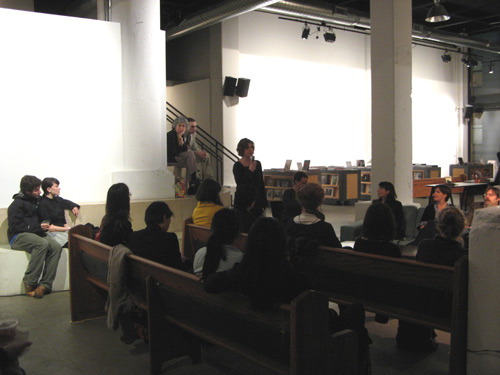
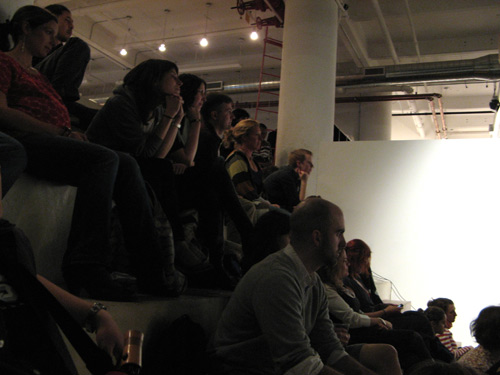
First up: Phoebe Damrosch, whose memoir Service Included: Four-Star Secrets of an Eavesdropping Waiter was released in September 2007. Damrosch read from portions of her book documenting her time as a server for Thomas Keller’s Per Se; her extensive months-long training involved memorizing wine pairings, receiving intricate movement instruction from an 18th-century dance specialist, and learning the provenance of menu ingredients down to “the names of the cows that produced the milk from which our butter was made.” The most entertaining bits were the gossipy snapshots of diners passing through the rarified restaurant; one priceless anecdote involved Damrosch gleefully bonding with one suburban banker over their mutual love of “pot”… before realizing that he in fact expressed a fondness for “pie.” (Uh, whoops.)
Kara Zuaro’s book I Like Food, Food Tastes Good: In the Kitchen with Your Favorite Bands is a collection of recipes gathered from touring rock musicians. Zuaro read from the book’s introduction, and from one of the stories that precede each band’s recipe. I was impressed by the breadth and high profile of her musical subjects: recipes ranged from simple sandwiches (Death Cab for Cutie’s vegan sausage and peanut butter creation) to a wild boar ragù from The Violent Femmes’ bass player Brian Ritchie. (Surprisingly, however, not a single pot brownie in the bunch.)
Finally, former Classics professor, current contributing editor Esquire Wondrich read from Imbibe!, his biography of 19th-century mixologist Jerry Thomas, author of the first known bartending guide, How to Mix Drinks or The Bon Vivant’s Companion (1862). Wondrich made an amusing argument about how the cocktail was America’s first great export, and the country’s introductory contribution to world gastronomic culture.
The audience Q&A was mercifully brief, and spawned a brief discussion over the use of the term “foodie” vs. “foodist” to describe a certain type of food-obsessed individual. Afterwards, the authors (Zuaro and Damrosch pictured below) made themselves available for book-signings:
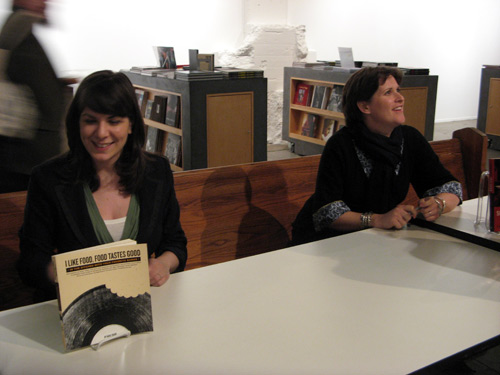
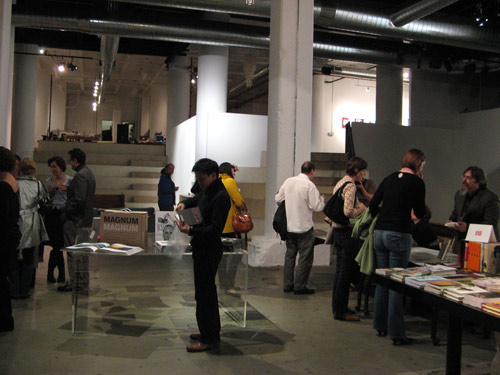
When in DUMBO, pizza at Grimaldi’s is always a solid choice. And sometimes, you can pick up a nice couple along the way.
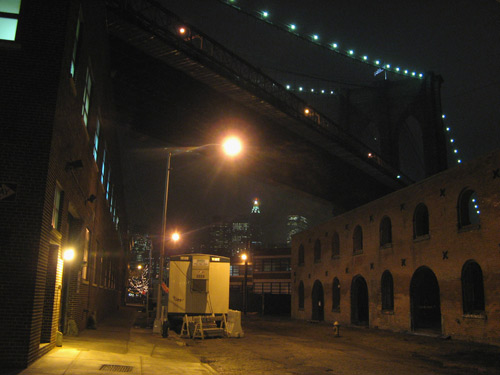
An evening with the Kitchen Sisters
With so many happenings around New York City on any given day, it’s good to have friends who will clue you into ones you would otherwise miss. Courtesy of a tip from JL (again!): “An Evening with the Kitchen Sisters” at NYU’s Kimmel Center for University Life, overlooking Washington Square Park.
Those who tune in regularly to NPR’s Morning Edition are probably already familiar with the duo of Davia Nelson and Nikki Silva. The two women, who first crossed paths while working on similar oral history projects in Santa Cruz, have been producing radio programs together since 1979. They are the renowned creators of the NPR’s series “Lost & Found Sound,” the Sonic Memorial Project, and “Hidden Kitchens”; their fascinating and provocative radio documentaries have earned them two Peabody Awards and a duPont-Columbia Award.
Most of tonight’s program was framed around the Kitchen Sisters’ past radio features, chronicling little told stories of American kitchen and food culture, past and present. The pair had an easy-going rapport with each other and with the audience (several members of whom were called upon to read from their book) — and much livelier than their Saturday Night Live counterparts.
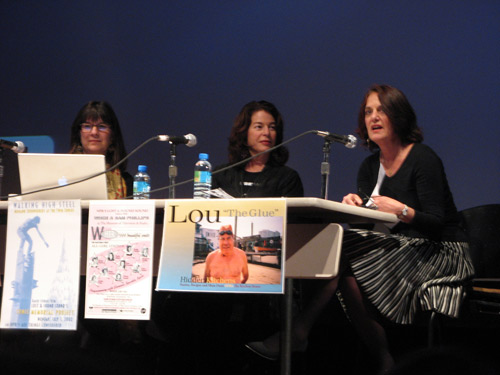
Nelson and Silva shared many fascinating stories about food subcultures: a Kosher cafeteria in New York City’s diamond district, Christmas dinner at a nail salon in San Francisco where dozens of Vietnamese manicurists convene from around the city… the women provided context for the stories while sharing selected clips from their radio series as well as a few listener phone messages that inspired the topics. Among the projects were a few non-food-related stories, such as that of WHER, the first “all girl” radio network that broadcast out of Memphis, Tennessee for 17 years, beginning on October 29, 1955. With hushed awe in their voices they talked about their interviews with members of the Mohawk Indian tribe, working precariously high above the ground to build much of our city’s skyline.
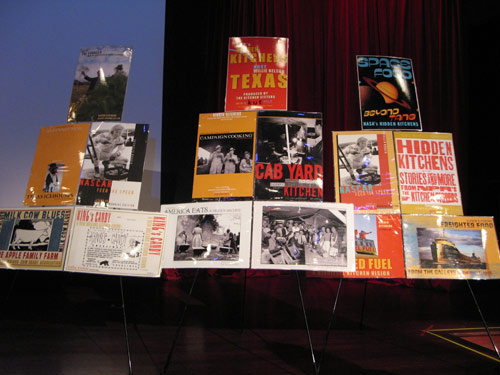
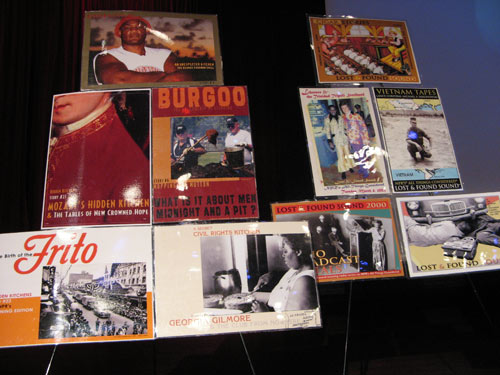
I was struck by the Kitchen Sisters’ obvious passion for their work — how would I go about getting a job like this? — and the women’s affection for their subjects; at one point, over an audio excerpt of their “Milk Cow Blues” story about an Indiana farm community divided over the sale of raw milk, Nelson was moved to visible tears, despite admitting to having heard the clip dozens of times before. The piece offered a nice segue for the women to introduce from the audience food writer Frederick Kaufman who in November, 2004 wrote an article for The New Yorker entitled “Psst! Got Milk?” about his infiltration of a private raw-milk coven in Hell’s Kitchen. (Slightly off-topic, Kaufman — who also happens to be Nelson’s cousin — amused everyone with his musings on food porn conventions.)
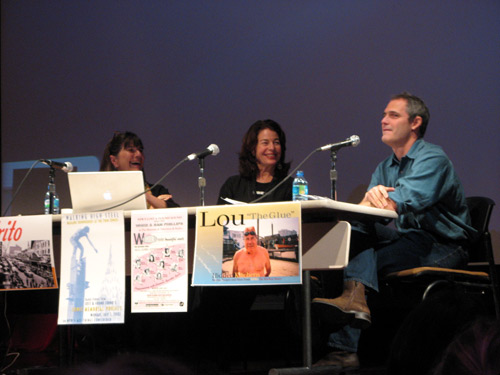
Finally, there was the ultimate “hidden kitchen” story of Robert “King” Wilkerson, who spent 31 years in the Angola State Penitentiary for his involvement with the Black Panthers, 29 of those years in solitary confinement. During that time, Wilkerson developed a recipe for pralines, prepared over a contraband stove in his cell fashioned from cans and tissue paper. As a free man now, he sells his candy with much of the proceeds going towards helping his still-imprisoned cohorts fight for freedom. The Kitchen Sisters brought baskets of King’s “freelines” with them this night, which were distributed throughout the delighted audience for sampling. A sweet ending to a wonderful night of stories.
| S | M | T | W | T | F | S |
|---|---|---|---|---|---|---|
| 1 | 2 | 3 | 4 | 5 | ||
| 6 | 7 | 8 | 9 | 10 | 11 | 12 |
| 13 | 14 | 15 | 16 | 17 | 18 | 19 |
| 20 | 21 | 22 | 23 | 24 | 25 | 26 |
| 27 | 28 | 29 | 30 | 31 | ||
Search
Popular Tags
Categories
Archive
- July 2010
- July 2009
- January 2009
- November 2008
- September 2008
- August 2008
- July 2008
- June 2008
- May 2008
- April 2008
- March 2008
- February 2008
- January 2008
- December 2007
- November 2007
- October 2007
- September 2007
- August 2007
- July 2007
- June 2007
- May 2007
- April 2007
- March 2007
- February 2007
- January 2007
- December 2006
- November 2006
- October 2006
- September 2006
- August 2006
- July 2006
- June 2006